Now I'm developing a project about softlayer api. I wan't to get the os list by softlayer api. Just like the portal site. Is there certain method to get correct os list ? regards~
2 Answers
Is there a specific language example you are looking for? If you use the SoftLayer CLI you can do this with the following command
slcli vs create-options # For Virtual Guests
slcli server create-options # For Bare Metal Servers
- 239
- 2
- 9
-
I use python language to program, thank you very much. – J.allen Dec 01 '16 at 01:49
-
`slcli vs create-options` takes a long time to respond but it works. – d4nyll May 08 '19 at 10:29
Unfortunately, it's not possible to retrieve the same result than Control Portal making a single call, but it's possible using a programming language.
To see programming languages supported by SoftLayer:
Take a look the following python script:
"""
List OSs for VSI similar than Portal
See below references for more details.
Important manual pages:
http://sldn.softlayer.com/reference/services/SoftLayer_Product_Package/getItemPrices
http://sldn.softlayer.com/article/object-filters
http://sldn.softlayer.com/article/object-Masks
@License: http://sldn.softlayer.com/article/License
@Author: SoftLayer Technologies, Inc. <sldn@softlayer.com>
"""
import SoftLayer
import datetime
import time
# Your SoftLayer's username and api Key
USERNAME = 'set me'
API_KEY = 'set me'
# Package id
packageId = 46
# Datacenter
datacenter = 'wdc04'
# Computing INstance
core = '1 x 2.0 GHz Core'
# Creating service
client = SoftLayer.Client(username=USERNAME, api_key=API_KEY)
packageService = client['SoftLayer_Product_Package']
# Declaring filters and mask to get additional information for items
filterDatacenter = {"itemPrices": {"pricingLocationGroup": {"locations": {"name": {"operation": datacenter}}}}}
objectMaskDatacenter = 'mask[pricingLocationGroup[locations]]'
objectMask = 'mask[pricingLocationGroup[locations],categories,item[id, description, capacity,softwareDescription[manufacturer],availabilityAttributeCount, availabilityAttributes[attributeType]]]'
filterInstance = {
'itemPrices': {
'categories': {
'categoryCode': {
'operation': 'os'
}
}
}
}
# Define a variable to get capacity
coreCapacity = 0
# To get item id information
itemId = 0
flag = False
# Define the manufacturers from which you like to get information
manufacturers = ["CentOS", "CloudLinux", "CoreOS", "Debian", "Microsoft", "Redhat", "Ubuntu"]
# Declare time to avoid list OS expired
now = time.strftime("%m/%d/%Y")
nowTime = time.mktime(datetime.datetime.strptime(now, "%m/%d/%Y").timetuple())
try:
conflicts = packageService.getItemConflicts(id=packageId)
itemPrices = packageService.getItemPrices(id=packageId, filter=filterDatacenter, mask=objectMask)
if len(itemPrices) == 0:
filterDatacenter = {"itemPrices":{"locationGroupId":{"operation":"is null"}}}
itemPrices = packageService.getItemPrices(id=packageId, filter=filterDatacenter, mask=objectMask)
for itemPrice in itemPrices:
if itemPrice['item']['description'] == core:
itemId = itemPrice['item']['id']
coreCapacity = itemPrice['item']['capacity']
result = packageService.getItemPrices(id=packageId, mask=objectMask, filter=filterInstance)
filtered_os = []
for item in result:
for attribute in item['item']['availabilityAttributes']:
expireTime = time.mktime(datetime.datetime.strptime(attribute['value'], "%m/%d/%Y").timetuple())
if ((attribute['attributeType']['keyName'] == 'UNAVAILABLE_AFTER_DATE_NEW_ORDERS') and (expireTime >= nowTime)):
filtered_os.append(item)
if item['item']['availabilityAttributeCount'] == 0:
filtered_os.append(item)
for manufacturer in manufacturers:
print(manufacturer)
for itemOs in filtered_os:
for conflict in conflicts:
if (((itemOs['item']['id'] == conflict['itemId']) and (itemId == conflict['resourceTableId'])) or ((itemId == conflict['itemId']) and (itemOs['item']['id'] == conflict['resourceTableId']))):
flag = False
break
else:
flag = True
if flag:
if itemOs['item']['softwareDescription']['manufacturer'] == manufacturer:
if 'capacityRestrictionMinimum' in itemOs:
if((itemOs['capacityRestrictionMinimum'] <= coreCapacity) and (coreCapacity <= itemOs['capacityRestrictionMaximum'])):
print("%s Price Id: %s Item Id: %s" % (itemOs['item']['description'], itemOs['id'], itemOs['item']['id']))
else:
print("%s Price Id: %s Item Id: %s" % (itemOs['item']['description'], itemOs['id'], itemOs['item']['id']))
print("---------------------------------------------------")
except SoftLayer.SoftLayerAPIError as e:
print('Unable to get Item Prices faultCode=%s, faultString=%s'
% (e.faultCode, e.faultString))
I added core variable, because the OSs have restriction for capacity of cores. Also I added datecenter to get the specific core item price for a specifc datacenter, perhaps it's something innecesary, but you can edit this script according your requirements.
The same idea could be applied for others programming languges.
I hope it helps, please let me know any doubt, comments or if you need further assistance.
Updated
I improved the script, I added the ability to check conflicts between items, in order to get the same result for each kind of Computing Instance
- 2,757
- 1
- 9
- 15
-
I improved the script. See the **updated** section in my answer – Ruber Cuellar Valenzuela Dec 01 '16 at 20:33
